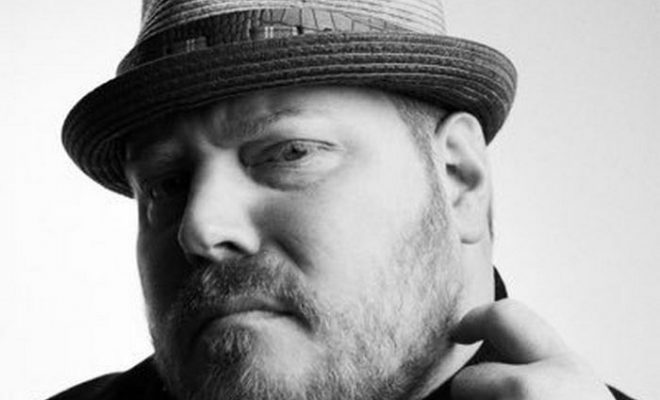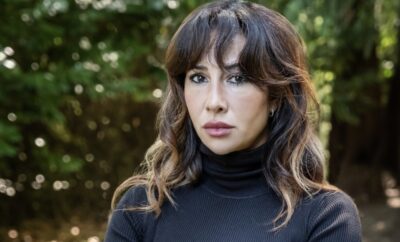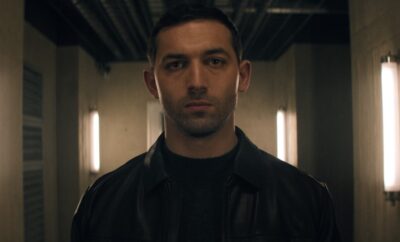
Interviews
Mike Houston – Orange Is The New Black
By: Kelly Kearney
Q: Your character is a new guard at Litchfield prison named C.O. Lee Dixon. What can you tell us about Lee?
A: What I can tell you is that Lee Dixon is a military war vet who, while in the service, didn’t put much effort into worrying about the aspects of military life. He more enjoyed the perks of free dorms, free living and free food. He’s a guy who when he sees an opportunity to get something taken care of that he doesn’t have to work too hard for he jumps on it. So, he was always the kind of guy that never had the command or authority others had. He was more a follower than a leader. Now, he’s found himself in this system [Litchfield Prison] and I think he becomes a little drunk with power.
Q: Now that Litchfield has changed from a state run prison to a private one, what kind of obstacles are the inmates as well as the guards facing?
A: I’m glad you touched on that. It’s interesting because the shift is that it’s going from state run to private run. We saw at the end of Season Three they had a big walk out from the guards that were presently there. They were disgusted over the fact the whole system had gone private and that they weren’t really going to be taken care of the same way. So, we see this new influx of guards that are literally hired to work those jobs and because of that there’s an oversight. I think that’s what makes it a little more challenging and scary, quite frankly.
Q: Are there any characters in “Orange Is The New Black” that you haven’t had the chance to work with but would like to?
A: I was actually really fortunate this season. I got to work with pretty much every major character in the show. I have some sort of interaction with all of them. It’s such an ensemble family that you work with everybody in your own way. I will say Adrian Moore who plays Cindy, she and I didn’t have any one on one thing. I was present in certain other things where she was there, but I would love to have some sort of tete- a- tete with her because I think she’s fantastic and it would be a lot of fun.
Q: Was this character of Lee Dixon inspired by anyone?
A: Not really. I took the idea of someone [laughs]. When I’m thinking about it, it’s kind of funny. It’s more based on the laziness of this guy; the way he approaches opportunities and lets things come his way. There was a guy I knew back in Boston and he definitely fit this profile. I’m not going to say his name. He’s a great guy, but I just think he didn’t understand what the idea of working hard and things just not coming your way. So, I used that just as a very small basis of foundation to get it started and then I just kind of took it and ran with it. I mean here’s a guy [Lee Dixon] who lives this way and then he actually gets some authority, what would that do? What would that be like? He’s a person who’s taken authority, but never took it seriously and now he’s in position where not only does he get authority but there’s really no oversight to it, so how would he react to that situation?
Q: Did you do any research for your role of C.O. Lee Dixon?
A: I did. I tried to do as much research as I could about veterans that come back from war and specifically the ones that weren’t able to jump right back into the workforce because of maybe PTSD. For example, a person who was expected to do this job but didn’t really have any aspirations beyond that. Someone who didn’t really know what they wanted and what happens when you take that [job] away? So, I researched what that experience is like and how does PTSD affect a situation where all of a sudden you’re given this power and what kind of triggers will set you of when dealing with prisoners and their reaction towards you. I did do some research of that sort of stuff.
Q: “Orange Is The New Black” found this niche between comedy and drama, will that continue this season or will the show head into a darker place?
A: I think it’s going to bridge really well. We’ve seen Litchfield now for three years as a minimum security prison. There’s a lot of relationships as an audience we get to watch and really invest in. I think the dynamic that they’re really working on this season is about making it privatized and state run, what’s the dangers when a company worries about its bottom line. People get lost in a company like that – the people the company is supposed to be working for. It’s all about shareholders and it’s all about profit. That inherently creates a bit of a darker story because we’re saying specifically look what happens about the bottom line and not so much about the people. There will be losses from that. There will be drama you probably wouldn’t normally experience at this point. They do a really wonderful job. I’ve said before, I think the tone that Jenji [Kohan] has set for the show is the exact same. When I watched the first episode it was so evident, in the comedy of it, knowing that we were going to be dealing with some difficult stuff. It’s very clear, from the first episode, that it’s this brilliant show that rides that line between drama and comedy in the same breath.
Q: What’s it like working in Upstate New York, as opposed to Los Angeles or Vancouver were the bulk of TV series are usually made?
A: It’s actually pretty cool because it’s nice to get out of the city [New York City]. When you go Upstate to shoot one of the more enjoyable things is that you’re really in this huge area of nature. It’s kind of a nice break from being in the city and there’s a serenity in it, too. It’s very quiet, you’re not dealing with the chaos of the city. I was just working on a show yesterday that was shooting in downtown Manhattan and it’s just a nightmare. You get everybody together, you get people focused and from one place to another and the amount of time it takes just to circle around the block…Whereas when you’re Upstate, it’s cool because we’re the only ones there. It’s like sort of going to a vacation house. You know you have your house here, in the city, and where we shoot on the studio lot. Then, you get to go away to the vacation home to shoot Upstate to do some of the other stuff.
Q: Is there a place in the prison where you enjoy filming the most or maybe even the least? Obviously nobody wants to go to the SHU…
A: [laughs] That’s a good question. I haven’t thought about that. The SHU, for me, not a big deal [laughing] because if I’m down there, I get to be on the outside. I would say the breakroom is always fun to shoot because there’s a couch there. Whenever they start telling us to find a place to hang out before we start shooting I like to lay down on that couch, it’s nice.
Q: What’s it like working with an all-female cast and Jenji Kohan the Executive Producer? Is it somewhat of a different experience for you and have you learned anything from it?
A: No, I don’t think it’s a different experience because I have a production company and we are all equals. both males and females. I think my challenge at first and, rightfully so, was being introduced to a new ensemble who’s known each other for so long. Also being introduced as someone that will be acting as an antagonist to that group of people, that ensemble, it serves the show as well that it took me some time to kind of find my footing in terms of when I felt it was comfortable to engage in a conversation off camera. I kind stepped back, let everyone hang out and do their thing and talk. I never had a sense that there was so many women and who do I hang out with. It’s not that dynamic at all. We’re all actors, we’re all writers and producers and creators and just being in that energy felt like walking into your family’s house for family dinner. When you do that, you don’t look at a the dynamic and think, I have this many sisters, this many brothers and that’s my mom. You just treat it as family where as Jenji and Lisa Vinnecour (the producers) were sort of the parents and it felt like just coming in and having dinner with your family. It more felt like that than anything else.
Q: What are you hoping fans take away from the show this season?
A: I would love for fans to walk away from this with a better understanding of what it’s like when you start from the top down and start thinking about money rather than people. You tend to start seeing fractions and breaks occur in ways it’s very difficult to come back from. I think audiences are going to see how dangerous it can be when you put the bottom line first. Specifically, in this kind of atmosphere, in the prison system, when we’re dealing with a mental health crisis in this country and were dealing with sentencing pay offs in terms of minimum sentences and you see all these people in rooms and putting more and more people in a system that can’t sustain it. Eventually something’s going to blow. Something is going to crack eventually and you don’t know how and when or how it manifests. I’m hoping that audiences take away from this season, that we have to be aware of how we keep people and the rehabilitation process. Also be aware that things that are relevant in this country right now, exist in the prison system as well. You see the Black Lives Matter movement and how that effects what goes on in the prison system and with relationships between different groups of people. Then you add an authoritative aspect as well and how they handle it compared to the prisoners.
Q: Are you amazed about “Orange Is The New Black” sparking the “Binge Watcher Generation.” People wait all year to skip work and school to watch the series straight through in one weekend. Are you surprised by the viewer’s enthusiasm?
A: It’s so funny that you asked this because I was just thinking about this just last night. I can’t say I was surprised I always sensed that once the streaming platform was available the fans would jump on it. “Orange Is The New Black” definitely helped bring on that idea. It is a little surprising hearing that a show is so impactful to someone that they stream it in one or two days so that they have to wait another year before they can see it again. Of course, I grew up in a generation where the traditional TV model was once a week you’d watch the whole season and then wait for the next and show’s still do a great job of that. Personally, if I watch a show like “Game of Thrones” even if the binge watch opportunity is there I like the idea of being able, as an audience, to talk about what we saw and the opportunity to digest the show. This is kind of amazing in that the show is so powerful that they call out of work to have this experience. Yeah, it is quite surprising. I never thought that something would be that engaging where you’d sacrifice nine or ten hours of your life to be in this world, which is a credit to the writers, directors and Jenji. They have this wonderful place that people like to go to and spend their time.
Q: You have a movie coming out with Julia Stiles and Josh Charles called The Drowning. Can you fill our readers in on what that’s about?
A: I didn’t have a large role in the film. I work with Josh and I play his old high school friend. It’s about a man who is confronted with a past decision that has come full circle and has left to deal with it in a manner he sees fit; how he’s able to approach this return of an event in his life.
Q: You talked earlier about your production company, The Collective. A for nonprofit theater and film company you started with Amy Schumer. What’s it like working with Amy and what’ something the fans would be surprised to know about her?
A: Amy is fantastic collaborator and person to work with. When we started the company, it was Amy, myself and seven others back in 2007. When we started it we all had this real drive to create work we thought was relevant and emotionally truthful. As we went along, Amy had gotten to really find some heat and find her legs with the standup circuit and has always been very supportive. She’ll bring her work into The Collective and gives us a chance to work on it with her, so she can hear it out loud. I will say one thing and I think people are starting to see this with Amy; that Amy is a phenomenal actor. I think we saw that in Trainwreck and she’s one of the best actors I’ve seen work and worked with. She and I did a small play, an anthology, some years ago and she had this one piece that she worked on that was about two women with children and one woman is accusing the other of child abuse. I’ve never been more blown away by watching someone handle material like that from a comedy background. Someone I knew and knew the background that she had, it just blew my mind. Amy is an amazing actor and artist.
Q: The fans on social media had a fun question for you Mike, they want to know if you could be any other character on OINTB, male or female, who would you choose?
A: [laughing] Wow, that’s a really good question. Simply because I love the way that she loves and protects and cares for the people who are close to her and also the way she has fun, I’d choose Danielle Brooks character of Taystee. I think being Taystee would be a lot of fun. She always finds opportunities to take people in and look out for them. She has such a huge heart so it would be really interesting to see the world from Taystee’s perspective.
Q: Is there anything else you’d like to tease from Season Four of “Orange Is The New Black?”
A: I’d say something to expect (which you might be hearing about in the reviews) is that there is a turning point in the show where the system has become a little more dangerous. That’s something to keep an eye on; how everyone [ at Litchfield Prison] responds to that threat to danger. That’s something that everybody should look out for. It will be very strong talking point of the show and how everyone responds to the changes and shift of treatment from the guards. The first three seasons we had guards who were authoritative, but also had relationships with the prisoners. There was this idea that we’re all in this together. You’re here to do this and I’m here to do that, but let’s try and do this together. I’d say this season people should be on the lookout that it doesn’t necessarily happen like you wanted it to.





You must be logged in to post a comment Login